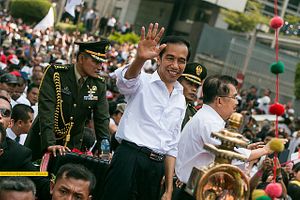The blowback over Indonesia’s latest decision to execute foreigners – including a four Nigerians, two Australians, and a Brazilian – will taint the presidency of Joko Widodo and cast a dim light over his factional rival Megawati Sukarnoputri, chair of the ruling PDI-P.
The pair are not on good terms, with speculation of a power struggle, and Megawati is prone to reminding Widodo that she is in charge. Hardly a healthy state of affairs for a government bent on handing out execution orders for drug offenses.
Nigeria proved itself diplomatically inept when it came to looking after its own. As for Brazil and Australia, they have every right to be angry.
Brazilian Rodrigo Gularte was shot for smuggling 6 kg of cocaine into Indonesia hidden inside surfboards – after he was diagnosed as a paranoid schizophrenic, delusional and with psychotic tendencies.
Australians Andrew Chan and Myuran Sukamara had spent 10 years behind bars and by Indonesia’s own reckoning had been fully rehabilitated, the job of a prison system. That apparently counted for nothing.
The latest killings were not the first, and there are more to come. As international anger continues to mount spare a thought for the many foreigners who are facing a similar fate in Southeast Asian prisons, regardless of their crimes.
Australia is long on experience on this score. Van Nguyen was a sticking point for the Singaporeans who executed him in 2005 for trafficking heroin.
By all accounts Nguyen was a solid student bullied into becoming a drug mule by thugs in Australia, upset by debts accumulated by his twin brother. Nguyen was led to believe that leniency would be shown if he told all. And he did.
Singapore is rarely celebrated for having much heart. It has a clemency rate of about one percent. Still, the authorities let Nguyen’s Mum give him a big hug in their final minutes together, while going cap in hand to Canberra with requests from the government-owned Singapore Airlines for access to Australia’s highly lucrative air route to the U.S. West Coast.
Prime Minister John Howard politely declined.
Back in the 1980s, Mahathir Mohammad reveled in the political theatrics he engineered after courts in Malaysia sentenced Kevin Barlow and Brian Chambers to death for drug running. Mahathir – a medical doctor by trade – allowed the executions to proceed and would become thoroughly miffed when Prime Minister Paul Keating later called him a recalcitrant.
This time around the Indonesians did grant a last minute reprieve for a Filipino, Mary Jane Velosa, who had been human trafficked into drug smuggling. That removed any lingering doubts about the power of the presidency but she should not have been there in the first place.
Too many nationalities have been represented in the gallows of Southeast Asia.
Only Cambodia and the Philippines do not have the death penalty, a topic that rarely rates a mention among the several hundred families that control the 10 governments within ASEAN.
Their focus is on money and power, and the launch of the ASEAN Economic Community towards the end of this year, which will enhance both.
Laws are being harmonized to allow for a significant shift in the 600 million people who live here. Crime demographics, like human trafficking, will change, and the perpetrators will increasingly be from neighboring countries where culture and punishments do differ.
Being a witness to a state sanctioned murder or, tragically worse, a botched one, is awful. I can vouch for that. Illicit drugs have been an issue across the region for decades and the death penalty clearly has not worked, is barbaric, and is not a punishment befitting of the crime.
Australia’s offer to pay for the upkeep of Chan and Sukamara while in prison was sensible and offered a diplomatic way out for Indonesian authorities bent on their executions and flexing their political muscle, as opposed to delivering a dignified justice.
Crime, punishment, and the gallows need to be tackled by ASEAN as a bloc while it attempts to forge a closer, regional community. Fail to do so and it risks alienating itself. It should be mindful that foreigners are not responsible for their illegal drug trade, which by Jakarta’s own reckoning, is flourishing.
Luke Hunt can be followed on Twitter @lukeanthonyhunt

































